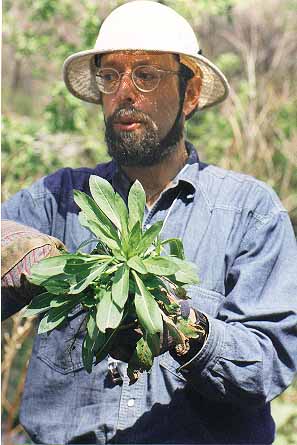Active Roster
Media
Sponsors
Private Events
Garden Club Program

"Wildman" with Common Evening Primrose
This hands-on environmental program focuses on common wild plants, putting people in touch with their environment and motivating them to understand science and to practice conservation. Participants get to see, touch, smell, and taste representative species of the wild edible and medicinal herbs, greens, fruits, berries, nuts, seeds, roots, and mushrooms that constitute the backbone of our local ecosystems. Many of the specimens that I bring into the garden club or that we find on a field walk are the same plants people remove or destroy in their backyards or gardens.
Few of us are familiar with these common renewable resources, or with their identification, natural history, food and medicinal uses, or with the folklore and science associated with them. Because we live in an age when environmental issues are crucial, we must do more than provide textbook information if we expect people to understand and appreciate the natural world and to play responsible role in conservation.
During the presentation, we approach wild plants from various perspectives. We begin with plant identification, emphasizing key characteristics, so everyone can recognize the various species. We include botanical and ecological concepts, and use stories, original botanical illustrations, and humor to impart life to the information. Tales come from natural and human history, as well as from my personal experience. We include ethnobotany-traditions of plant use for food, medicine, and crafts-as well as some the ways folk wisdom complements science.
Related information from many areas of science is interwoven, and participants are encouraged to ask questions. Conservation is paramount. We distinguish between renewable and non renewable resources, and stress the importance of managing our planet wisely. Appreciation of nature, more than fear of environmental destruction, leads us to take conservation to heart. We also bring up my well-publicized history as an urban naturalist, including my arrest by undercover agents for eating a dandelion in Central Park.
The program time, which may be varied, usually runs for 60-90 minutes. It can be indoors, outdoors, or a combination of venues. My goal is to get people directly involved with their environment, and to inspire them to protect and preserve our nonrenewable natural resources.
Field Trip Checklist
- Large and small Ziplocs or Baggies-for vegetables and herbs
- Paper sandwich bags for mushrooms, which spoil in plastic
- Plastic containers (yogurt-sized) for berries of late spring, summer, and fall
- Drinking water or juice (in hot weather)
- Optional: A sturdy digging tool for roots
- An extra layer of warm clothing in cold weather
- Waterproof footwear if it has been raining heavily, and rain gear if there's a chance of rain
- A pen to fill out a waiver
- Rubber gloves for black walnuts and ginkgo nuts in autumn
- Payment for instructor—please don't forget!
- Smoking is strictly prohibited at all times, even while the group is assembling.
Watch a presentation for the Pleasantville Garden Club
November 5, 2009
Intro, Lamb's-Quarters, Epazote, Black Walnut, Burdock, Mugwort, Chickweed, Goutweed, Kousa Dogwood, Chicken Mushroom, Oyster Mushroom, Conclusion
Contact
Phone: (914) 835-2153
Message: 914-400-9135
Email: wildman@wildmanstevebrill.com